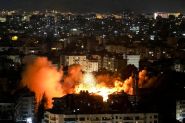- Home
- War in the Middle East
- Flurry of International Diplomatic Efforts to Settle Regional Conflicts

Will military action precede diplomatic efforts to settle regional conflicts, starting with a solution to the war in Gaza? According to informed sources, the decision to end the conflict in the tiny enclave has been taken, and negotiations are underway to agree on the details of a permanent and final solution to the Palestinian issue.
There is already talk among the warring sides about “the next day,” as the possibility to end military operations is gaining momentum. Efforts made in this context include Egypt’s “piecemeal” initiative, aimed at finding a solution for both Israel and the Palestinian territories, and the intensification of communications between Qatar and Iran. All actors have now been instructed to work towards a solution under the auspices of the US. Washington is adamant about the two-state solution, which explains why Palestinian Authority President Mahmoud Abbas is engaged in extensive contacts to form a government of technocrats that would implement the settlement.
A French official noted that Secretary of State Anthony Blinken’s return to the region for the fifth time clearly demonstrates US resolve to end the military conflict in Gaza and reduce tensions in South Lebanon that could have a heavy impact on Lebanon’s fate and future. In fact, Blinken’s mission will be to “market” the Egyptian initative to Israel.
Everyone is awaiting the results of the negotiations, given that no country except the US has the power to end the war. Washington wishes to solve the conflict and the turmoil it has generated, including violence in South Lebanon, tensions in the Red Sea, and the intensification of Israeli raids against Hezbollah and Iranian revolutionary guards’ positions in Syria with the aim of preventing the delivery of weapons to Hezbollah.
On an equally positive note, these same sources have indicated that Lebanon is on the last stretch to elect a President of the Republic. This could happen in parallel with positive changes in Gaza that include a cessation of hostilities and initiation of the detailed implementation of a settlement. “Ongoing negotiations over the Egyptian initiative will help accelerate the election of a president and the formation of a government in Lebanon,” according to the sources.
The convergence of interests between the opposition and the “Shiite duo” (Hezbollah and Amal), which resulted in extending the mandate of the army commander-in-chief, is a positive indication that a similar agreement could be reached to elect a president. According to French presidential envoy Jean-Yves Le Drian, who visited Lebanon on November 29, this is why the opposition called upon the “Shiite duo” to renounce their candidate and consider a third one.
The president to be chosen must have a profile that corresponds to the criteria drawn by the five-nation group (US, Saudi Arabia, France, Qatar and Egypt) and Maronite Patriarch Bechara al-Rai; any other candidate will fail.
In anticipation of a possible deceptive deal, Lebanese Forces leader Samir Geagea declared, on behalf of the opposition, that “the implementation of resolution 1701 bears no relation whatsoever to the presidential issue. “All we are asking for is that the next president not to be a mere picture hanging on the wall in Baabda, and we are not advocating for any candidate in particular,” Geagea said. His statement came in reaction to leaked information indicating that Hezbollah “informed the Group of Five, through mediators, that it would be ready to implement resolution 1701, provided there would be an authority (a president) that would guarantee it could keep its weapons, so that its withdrawal from the south of the Litani river would not be done under the auspices of an authority and a president that would stab it in the back” – and push for the implementation of international resolutions that would strip it of its weapons.
In that same context, informed American sources interviewed by This Is Beirut stated that the US is endeavoring to accelerate the presidential election process – as vacuum is not an option in the current circumstances – and that the new American ambassador, Liz Johnson, who worked at the embassy for two years alongside former ambassador Vincent M. Battle, knows Lebanon very well.
According to the sources, Johnson carries a list of US demands: Hamas and Islamic Jihad leaders should be driven out of Lebanon, so that it would not be targeted later; armed presence south of the Litani should be limited to the Lebanese army, the Lebanese security forces and UNIFIL; and international resolutions 1860, 1559 and 1701 must be fully implemented. The sources added that “the US initiative included a deadline for electing a president that would put Lebanon back on track,” and that Washington has recently begun coordination with the Lebanese parties to that end.
The American sources noted that the election of a president “would unlock much needed financial support for Lebanon’s economy, provided that military operations on the border with Israel come to an end.”
The US demands will be voiced by President Joe Biden’s Special Envoy and Coordinator for International Energy Affairs, Amos Hochstein, who is expected to visit Beirut soon. Hochstein’s mission will include pushing for the presidential election, helping in the implementation of resolution 1701, and facilitating a land border agreement with Israel by resolving 13 points of contention. Hochstein’s visit would coincide with the arrival of a Qatari envoy who will also be supporting the presidential election effort.
Moreover, French envoy Jean-Yves le Drian should be visiting Lebanon soon, if President Emmanuel Macron does not call upon him to form a new French government.
The Group of Five will also hold a “pivotal” meeting to accelerate the election of a president.
In the meantime, Speaker of Parliament Nabih Berri has replaced the proposed “week of dialogue” – to precede the election of a president – with bilateral talks away from the spotlight, pending a political consensus over the identity of the future head of state.
Read more



Comments